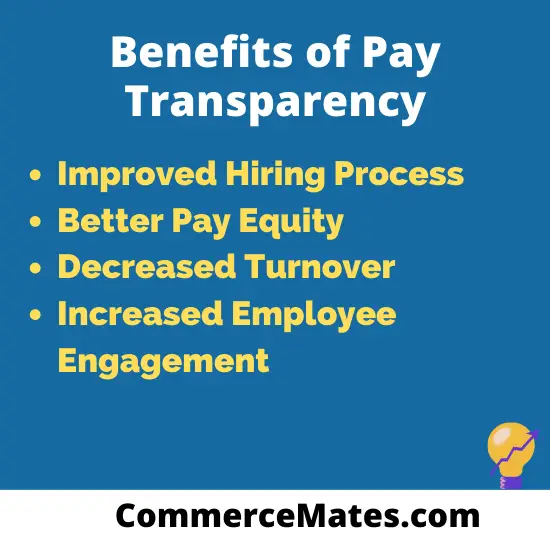Contents
What is Pay Transparency?
Pay transparency refers to the open and transparent communication of company salaries. It encompasses various approaches, ranging from simple practices like disclosing salary ranges in job advertisements to more comprehensive measures that grant employees unrestricted access to individual salary details.
In today’s job market, job seekers are increasingly wary of vague promises of a “competitive salary” in job ads. They crave transparency and desire to understand what they can expect before investing their time and energy in the application process. One way to incorporate pay transparency is by setting a different salary account for your employees. Benefits of salary account are endless, one of them being the easy access to loans when your company ties up with a bank to open these accounts.
How to Find Salary Information

Job Listings
Although you won’t find many companies following this, a handful of organizations list the salary ranges an employee can expect for the applied job position. This allows to create pay transparency before the process of interview even begins. A candidate can analyze whether they want to apply for that salary range.
Salary Websites
Some salary websites, like Glassdoor, Indeed, Payscale, and LinkedIn, contain some tools and resources that can help you get salary data of the company based on the different roles.
Interview Process
As a candidate, you can enquire about the salary range of the position you’ve applied to during the initial interview process to maintain pay transparency and make an informed decision.
Internal Sources
There are several companies with their own intranet. If some employers disclose the salary pay range for a particular job opening, the existing employee can spread it on the intranet or share a file containing job details with the salary range.
Public Sources
Although a handful, some companies choose to share their employee’s exact salaries with the world through the company site. This helps create pay transparency between the employer and the potential candidate applying for a position.
Benefits of Pay Transparency
There are several benefits attached to keeping pay transparency in the hiring process. So, whether you are an employer or an employee, there’s a benefit for everyone.

Improved Hiring Process
As far as salary concerns, the traditional most-followed hiring process has no scope for pay transparency. By keeping the salary transparent, the focus is shifted to a better hiring process as candidates know the salary bar they are applying for, decreasing disappointments later.
Better Pay Equity
A study by Glassdoor revealed that women are less likely to negotiate their salaries than men. This is one of the dreaded results of the global gender pay gap. By adding pay transparency to the recruitment funnel, measures can be taken to curb the gender pay gap, as all candidates can begin with the same pay.
Decreased Turnover
Pay perception is a real thing. It’s connected to the employees’ thoughts about whether they are being paid fairly. Most of the time, if the employees think they are being paid lesser than the market value of the job position, they are more likely to quit. Keeping transparency in pay can help to decrease the employee turnover rate.
Increased Employee Engagement
When the employees are satisfied with their pay and know they are being paid appropriately, they are more likely to increase their engagement in the company, resulting in higher company profits.
How Can Salary Calculator Help with Pay Transparency?
In the pursuit of pay transparency, salary calculators emerge as a valuable tool for employees and job seekers, enabling everyone to estimate their potential earnings by:
- Accessing compensation information
- Empowering negotiations
- Becoming aware of the job market
However, it’s crucial to recognize that while these calculators provide valuable estimates, they may not encompass the entire scope of compensation factors. Company size, industry, benefits, bonuses, and individual performance can all impact actual earnings. Nevertheless, salary calculators are an initial reference point, facilitating a more transparent conversation regarding salary ranges.